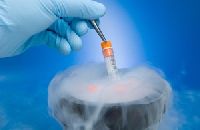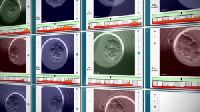
freelance seo service

Frozen Embryo Replacement
Embryos left over from an IVF and ICSI cycle may be stored and used for subsequent cycles should a couple wish to have conceive again or at a later stage in life. The freezing of embryos is termed Cryopreservation and the process by which it is done is called Vitrification. Vitrification is achieved by quickly plunging the embryos into freezing liquid Nitrogen. The speed with which this is done ensures that water in the embryos doesn’t crystallize into ice crystals. Embryos may be stored from between 10 – 55 years. The advantage of being able to utilize frozen embryos is that a couple can put off another pregnancy for whatever reason, without being too limited by increasing maternal age. Additionally, it costs less to use embryos frozen from a previous cycle when compared with a whole new Assisted Reproductive Cycle. However it is worthy to note that frozen and thawed embryos have a lower viability rate when compared with fresh embryos created from a current cycle.
...more
Embryoscopy Treatment Service
‘Conceive’ – The Gynaecology & Fertility Hospital is happy to offer the facility of Embryoscopy which is an advanced tool to assess the growth changes in the early days of embryo life. It helps both the couple and the scientist to select best embryos through sequential live images, which can be recorded and replayed for future analysis if in case the treatment cycle is unsuccessful. Research has already confirmed the benefits and safety of this procedure. Above all there has been strong evidence of an increase in take home baby rate and decrease in miscarriage rate, when embryoscopic culture was compared with the conventional culture system. We hope that this asset will improve the success rates in our sub fertile couples.
...more
Advance SEO Training

In-vitro Fertilization (IVF)
Louise Brown, born in July 1978 in England was the world’s first IVF (اطفال الانابيب) or in vitro fertilization baby. The term “in vitro” comes from the fact that the process of fertilization takes place in a laboratory petri dish rather than in the woman’s body. IVF is the process of fertilization outside the wife’s womb whereby eggs are retrieved from the ovaries and then met in a petri-dish in the laboratory by a sample of sperm which in turn has been extracted from the husband. With an IVF clinic in Sharjah and an IVF centre in Dubai, Conceive Gynecology and Fertility Hospital is available to help couples seeking IVF treatment in UAE catering to all the emirates from Abu Dhabi to Dubai to Sharjah to Ajman to Umm Al Quwain to Ras Al Khaimah and even Fujairah. To find the Conceive IVF clinic location closest to you visit our CONTACT US page. Why do I need IVF treatment in UAE? When a couple comes forth for infertility treatment, they are first thoroughly examined, assessed and evaluated in terms of their medical history and reproductive abilities. Accordingly they’re advised to opt for in vitro fertilization which will maximize their chances of a successful pregnancy. Couples with the following conditions are considered for IVF treatment in Dubai: • Women with damaged or blocked Fallopian tubes. The fallopian tubes, also known as oviducts, uterine tubes, or salpinges (singular salpinx) are uterine appendages leading from the ovaries into the uterus. The egg travels this path and it is within the tubes that they ‘meet’ the sperm to fertilize into an embryo. The resulting embryo travels down the tube to the uterus to implant in the latter.
...more
Intra Cytoplasmic Sperm Injection (ICSI)
Intra Cytoplasmic Sperm Injection (ICSI الحقن المجهري) is a specialized form of fertility treatment for severe cases of male-factor infertility. When the husband’s sperms have poor movement (or the count is very low, IVF will not work, as the sperms will not be able to enter the eggs. In these situations, ICSI treatment is the only option. ICSI in Dubai is carried out under an especially powerful microscope. By means of a very fine needle, each egg is injected with a single sperm. If fertilization and cleavage occur, the embryos are then replaced into the uterus. It is one the most cost-effective and successful treatments for infertile men.
...more
Assisted Embryo Hatching
The Assisted Embryo Hatching technique was in 1990 at Cornell University, New York by a team headed by Dr. Jacques Cohen. This is a technique which is an added one in conjunction with IVF or ICSI. Who should be treated with Assisted Embryo Hatching? If a women’s embryos are unable to hatch themselves then assisted hatching is recommended to boost pregnancy success. At Conceive Gynecology and Fertility Hospital, An embryologist observes the embryos shape and zona characteristics to determine the embryos to be selected for Assisted Hatching. This technique may be carried out for women who: Are 35 years or older Have embryos with thick Zona Pellucida Have had repeated implantation failures while using frozen replaced embryos How is Assisted Embryo Hatching Performed? Assisted embryo hatching is a delicate process performed with the help of micromanipulation techniques and under a microscope only after third day of embryo development. The embryo formed as a result of fertilization is covered by a gel-like shell called the ZonaPellucida. In the laboratory, this ZonaPellucida is weakened by a LASER beam in an attempt to create a hole in it. This allows for the existing embryo within escaping easily and implant in the woman’s uterine lining (called the Endometrium). Successful implantation means pregnancy.
...more
Pre Implantation Genetic Screening Service
PGD (اختيار جنس المولود) is a form of early prenatal diagnosis that is used to detect chromosomal abnormalities in the resulting embryo. It identifies embryos at risk and allows for the prevention of transmission of inherited diseases to the next generation and/or a possible miscarriage during the pregnancy. The embryos used in PGD are created through either IVF or ICSI treatment. Who should be treated with PGD? With increasing maternal age, there is a greater chance of more or all embryos being abnormal. At age 40 years, 13% of women have all abnormal embryos. As such PGD is indicated for: Women over the age of 35 years Couples with recurrent and unexplained miscarriages Couples who have experienced several failed IVF cycles Couples who have had a prior pregnancy with a chromosome abnormality An accurate and thorough history obtained through a consultation at Conceive Hospital will determine whether a couple is required to undertake a PGD (تحليل الكروموسومات) of their embryos. How is the PGD performed? Pre Implantation genetic diagnosis (PGD) starts with the standard process of egg retrieval following Ovulation Induction and then fertilization of the eggs in a laboratory through IVF or ICSI. The resulting embryos undergo cell division that is monitored. By means of a state-of-the-art laser, a hole is drilled into a 3-day-old embryo and a single cell is harvested for biopsy purposes. Once biopsied and approved, the embryo may be transferred into the woman’s uterus.
...more
Percutaneous Epididymal Sperm Aspiration (PESA)
If a blockage in the epididymis or congenital absence of the vas deferens (the drainage tube for sperm from the testis to the penis), is the cause for Azoospermia (no sperm in the semen), then this procedure is indicated for obtaining sperm. A very fine needle is inserted into the Epididymis (the sperm collecting tube outside the testis) and sperms are aspirated. This procedure is performed under local anaesthesia, requires no incision, and the patient can get back to work the same day.
...more
Testicular Sperm Aspiration (TeSA)
In some men, the production of sperms in the testis is very low and no sperms are seen in the semen. TeSA is a way of obtaining the few sperms that are available in the testis. Using local anaesthesia, a needle is inserted into the testis to obtain some tissue. This tissue is carefully dissected in the laboratory and the few sperms obtained may be used for ICSI or frozen for later use.
...more
Ovulation Induction
Ovulation Induction (controlled ovarian stimulation) Ovulation is a process by which a woman’s ovary releases a mature egg or oocyte. It is this Oocyte that fuses with a sperm to form an embryo in the process termed Fertilization. Naturally, a woman produces only one oocyte per month. Ovulation Induction is a process by which the woman’s ovaries are stimulated through the use of hormones and medication to produce several eggs or oocytes in one cycle, thereby increasing chances of getting pregnant. Ovulation Induction is carried out for women who ovulate infrequently as a result of irregular menstrual cycles or who do not ovulate at all. The timely use of medication and hormone injections is vital for success and at Conceive Gynecology & Fertility Hospital the nurse practitioners are ever willing and available to guide you through the process. The growth and maturation of eggs is tracked through ultrasound scans. Once Ovulation has occurred, the couple can either try to conceive naturally or go in for Intrauterine Insemination (IUI). If the couple is advised to go in for IVF and ICSI treatment, the physician will harvest the eggs.
...more
Artificial Insemination or Intra Uterine Insemination (IUI)
Intrauterine Insemination (IUI) or Artificial Insemination is a fertility treatment that includes placing sperm into the woman’s uterus to expedite pregnancy conception. The purpose of IUI (التلقيح الصناعي iui) is to increase the sperm numbers that reach egg as it travels down the fallopian tubes and eventually boosts the chances of fertilization. IUI is the least invasive infertility procedure and inexpensive when compared to IVF and ICSI. Who Needs IUI Treatment? This procedure is indicated for couples where the husband has normal sperm parameters or sperm with mild abnormalities and the wife has open fallopian tubes (these carry the egg from the ovary to the uterus). It is also recommended for patients who have difficulty during sexual intercourse.
...more
Blastocyst Transfer
Blastocyst Transfer is a technique that was introduced in 1988 by Stanford University. Embryos formed as a result of fertilization are cultured in the laboratory for 5-6 days. In this time, the cells of the embryo rapidly divide and on day 5 it is referred to as a Blastocyst. Transferring a 5-day-old embryo or Blastocyst into a woman’s uterus may improve the chances of implantation and in turn, a successful pregnancy. It also reduces the risk of multiple pregnancies, which is a problem with Assisted Reproductive Techniques (ART) and which pose medical risks for both the mother and the infant along with financial and emotional considerations. See video below for how Embryos are transferred into a woman’s uterus.
...more
Treatment of Recurrent Miscarriages
A miscarriage is the spontaneous loss of a fetus before the 20th week of pregnancy. (Pregnancy losses after the 20th week are called preterm deliveries). Most miscarriages are caused by chromosome problems that make it impossible for the baby to develop. Usually, these problems are not related to the mother or father’s genes. In about half of all early miscarriages, the baby does not develop normally right from the start and cannot survive. Other possible causes of miscarriage include: Drug and alcohol abuse Exposure to environmental toxins Hormone problems – Women with very irregular periods may find it harder to conceive and when they do, are more likely to miscarry Infection – Minor infections like coughs and colds are not harmful, but a very high temperature and some illnesses or infections, such as German measles, may cause miscarriage Obesity Physical problems with the mother’s reproductive organs Problem with the body’s immune response – Problems in the blood vessels which supply the placenta can lead to miscarriage, especially if the blood clots more than it should. Serious body-wide (systemic) diseases in the mother (such as uncontrolled diabetes) Smoking
...more
Hysteroscopy Surgery
Hysteroscopy is a procedure that allows a doctor to look inside your uterus in order to diagnose and treat causes of abnormal bleeding. Hysteroscopy is done using a hysteroscope, a thin, lighted tube that is inserted into the vagina to examine the cervix and inside of the uterus. Hysteroscopy can be either diagnostic or operative. Hysteroscopy is a relatively safe procedure. However, as with any type of surgery, complications are possible. With hysteroscopy, complications occur in less than 1 percent of cases and can include: Risks associated with anesthesia Infection Heavy bleeding Injury to the cervix, uterus, bowel or bladder Intrauterine scarring Reaction to the substance used to expand the uterus At Conceive Gynecology & Fertility Hospital , hysteroscopic surgeries are performed to correct the following uterine conditions: Polyps and fibroids — Hysteroscopy is used to remove these non-cancerous growths found in the uterus. Adhesions — Also known as Asherman’s Syndrome, uterine adhesions are bands of scar tissue that can form in the uterus and may lead to changes in menstrual flow as well as infertility. Hysteroscopy can help your doctor locate and remove the adhesions. Septums — Hysteroscopy can help determine whether you have a uterine septum, a malformation of the uterus that is present from birth. Abnormal bleeding — Hysteroscopy can help identify the cause of heavy or lengthy menstrual flow, as well as bleeding between periods or after menopause.
...more
laparoscopy
This procedure is also known as keyhole surgery or minimally invasive surgery. Large incisions can be avoided during laparoscopy because the surgeon uses an instrument called a laparoscope. This is a small tube that has a light source and a camera, which relays images of the inside of the abdomen or pelvis to a television monitor. The advantages of this technique over traditional open surgery include: a shorter hospital stay and faster recovery time less pain and bleeding after the operation reduced scarring
...moreBe first to Rate
Rate ThisOpening Hours